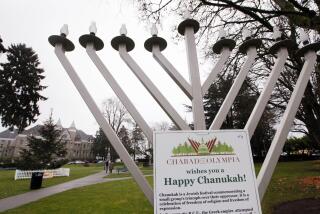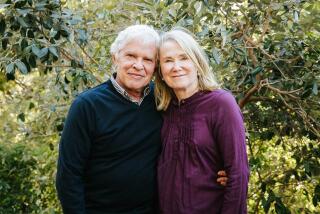In Over His Head? : * Religion: Mendel Duchman’s new Chabad congregation was successful from the start. But when it started to expand, so did its troubles.
IRVINE — You can tell Mendel Duchman’s story in 25 words or less:
Brooklyn boy decides to become a rabbi and do great things. He makes a big splash in Irvine, but later things don’t go so good.
There’s a little more to it than that, of course. The last of the lawsuits has been settled. And the congregation at Chabad of Irvine Jewish Center, once in danger of dissolving, is rebuilding and looking for ways to pay off its estimated half-million-plus dollars of debt.
Duchman, who created the center from nothing and built it into one of Chabad’s larger congregations, has resigned his post. He is living somewhere in the San Fernando Valley, counseling families, who in turn are paying his bills.
But he says he’s neither disgraced nor exiled.
“Everybody still feels firmly that I’m going to be back there. . . . Right now I’m keeping my distance just as a matter of protocol, but those people are my people. In a year, the problems will be history.”
The Chabad organization was founded in Russia in the 18th Century, and its members are Hasidic, Orthodox Jews known for their ecstatic singing and dancing. They don’t drive their cars on the Sabbath. They keep strict dietary laws. Men and women sit separately in synagogue.
Religious education is so important that most men study and are ordained as rabbis, even though many do not go on to lead congregations.
So as his grandfather and father and brothers had done, Duchman entered rabbinical school. Then he dedicated himself to working for Chabad.
He worked at Chabad centers near Paris and in Cincinnati, then in 1979 at 22, he was invited to Westminster and hired as associate director of the local Hebrew Academy. Things began to happen fast.
A group of five South African immigrant families hired Duchman to start an Orthodox congregation in Irvine. He, his wife and infant daughter moved there, supported by Chabad headquarters until the new “community” could take over his expenses.
Friday night services began in Duchman’s living room with the five families. A newspaper ad a month later boosted attendance to 30 families--about 75 people.
“We wanted to open a school, an afternoon Hebrew school. . . . We needed a house where we could set up a few classrooms, offices. So in six months, the decision was we were going to take a three-bedroom home on a cul-de-sac.”
A $140,000 house in University Park was bought in cash with money from the original five families.
These acts of generosity are considered miracles, channels through which the Lord provides, but they are not that rare, said another Chabad rabbi. You come to expect them sooner or later.
Duchman said he was flying high, buoyed by the rapid growth of his congregation. “There was no proper board (of directors) at that time. It was basically whatever was needed, it was done. I basically did it by myself.”
So in September, 1981, when the usual hall Duchman rented for the big High Holy Days services was unavailable, he begged use of a vacant lot at Royce Road and Yale Avenue and erected a circus tent.
“We were on the front page of the papers. People went crazy. And we literally had, with no exaggeration, we had over five . . . hundred . . . people to services. Just the fact that it was a unique place. That’s really what put us on the map.
“And then came the downer, of course, of going from this tent back to this little house.”
So, Duchman began working to move permanently. The owner of the lot, the Mormon Church, agreed to a low rent. Portable buildings were bought and moved there one night.
“The next morning the community woke up to this, and from then on it was a disaster. For two years it was a nightmare, a total nightmare. . . . “
Duchman had received city approval but not approval from the powerful Irvine homeowner associations, who through deed restrictions have quasi-government powers. It would take two years and cost $200,000 to meet their landscaping and other requirements.
For the first time, Duchman went outside of the congregation for a loan. He went to a bank.
Said Duchman: “People there who were part of the founders, they’re saying: ‘Let’s go, Rabbi. We’re in for it,’ and they (co-signed the loan). . . . Then we started to be, as we say, from little boys to big boys.”
First came a preschool, a full-day nursery. There were 17 children, then 33. And when the children reached kindergarten age, the parents wanted them to remain in a Jewish school, so they wanted Duchman to create a kindergarten. At that time, the dues-paying congregation numbered about 100 families, but about 800 families were using the center in one way or another.
“The kindergarten . . . was a good decision. But then (a year later) came the first grade. And I remember sitting together with seven parents and they were saying: ‘Please, Rabbi, how could you not do this? We need a day school.”
Then second grade. Then third grade. Then fourth grade. “And when the issue was whether we were going to make a fifth grade, I said: ‘That’s it.’ ”
Because by then, the center was in a circular trap of obtaining new loans to pay old loans and meet daily operating expenses. By then the paid staff numbered 27, including four rabbis. At its peak, the annual budget was about $700,000.
“Our goal was always to help this young man, to tide him over until his receivables came in,” said one donor. “We have done that--$2,000, $5,000, maybe $10,000--and never had a problem. It was paid back within a couple of weeks.”
It may seem reckless in retrospect, “but that’s how we operate,” Duchman said. “I’ll tell you why so you’ll understand: Because my father and my grandfather and my great-grandfather, their saying ‘yes’ (meant) sitting in jail in Russia (for furthering the Chabad cause). So here it’s only money. What’s money? ‘We’ll get it together, OK?’--that’s really the undertone why we are so committed.”
There were other factors, such as the defection of many of the well-heeled South Africans to a new, “modern Orthodox” synagogue in town, Duchman said. “All of a sudden there are two cups, and less water goes into each cup.”
Duchman called an emergency meeting in July, 1989, “and the people we owed money, we said you’re going to wait, instead of taking from Peter to pay Paul and Paul to pay Peter.” His plan was to eliminate the money-losing day school, bring expenses under control, form an emergency committee and begin to climb out of the financial hole.
“People were very angry,” said a donor who attended the meeting. “People were screaming. There were people in the room who suggested that they’d given maybe several hundred thousand dollars.”
Rabbi Baruch Y. Hecht, associate director of Chabad headquarters in Los Angeles, attended the meeting and told the congregation, some of whom were creditors, exactly what they didn’t want to hear: “It was their debts. It wasn’t my debts.
“These (Chabad centers) are all separate California nonprofit corporations with separate employer ID numbers and separate names and titles. They’re deliberately established that way because part of our policy, our organizational policy, is that each center must take financial responsibility for itself.”
Headquarters paid off $200,000 of loans it had guaranteed on behalf of the Irvine center, but it had harsh words for Duchman.
“We said to him: ‘Either you make it or you don’t,’ ” Hecht said. “ ‘If you’re not going to make it, leave, and then we’ll have no choice but to clean up your mess.’ ”
Hecht said Duchman wanted to remain and try to pay off the debts, even though some in Irvine were crying for his head.
Duchman said that those most critical of him had previously been “with me all the way.” Hecht said he’s seen it before.
“When things are going well, everybody jumps on with the winner. It’s just ‘Keep goin’, Rabbi, you’re doin’ great.’ And in the infinite optimism of Rabbi Duchman, I think he thought ‘Keep goin’, you’re doin’ great’ meant ‘The check is coming.’ And it didn’t happen.”
After the emergency meeting in 1989, things simmered but were under control, Duchman said. Operating expenses matched income, although the old debts still loomed.
Then on July 17, Duchman resigned.
Duchman said he left because the death of his father, and then his father-in-law, altered his perspective. He wanted to be less of a workaholic. But his sudden resignation “freaked out the creditors,” he said.
“Maybe because I resigned, they’re settling, because there’s no one out there to carry the burden,” Duchman said. “As long as I was there, (headquarters) figured: ‘Listen, let him worry about it. Let him handle it.’
“Now that there’s nobody there--the new rabbi don’t want it--so headquarters got to step in, and they are stepping in,” he said. “So maybe my resignation was worth its while.”
The lawsuits from banks have been allayed by reducing interest and setting up a new payment schedule, Hecht said. The last lawsuit, filed by a former member of the congregation, was settled in October.
Chabad headquarters will pay until the Irvine center, now called South County Chabad, can begin making payments, Hecht said. But headquarters expects to be reimbursed by the Irvine congregation, “although we’re the last on the list,” he said.
Rabbi Alter Tenenbaum, who is Duchman’s brother-in-law, moved from Chabad in Laguna Beach to take over the troubled center in Irvine.
“We lost a lot of members,” said Colin Becker, one of the committee members. “We had a very, very large community beforehand,” about 240 dues-paying families. “It dwindled down to 10 or 15 families. With Rabbi Tenenbaum being appointed, he has actually stabilized the membership. At present there are about 40 paying families.”
He said the congregation is aware they are morally obliged to repay the debt. He said fund-raising events are being planned and potential large contributors are being approached.
Looking back, Duchman said that he “probably should have tightened up on some of my yeses, have a little more lay people carrying some of the load. . . . I was a young guy, and I just bulldozed right through.”
“I am a supporter of his,” said a creditor who’s out about $14,000. “He was dedicated and he worked very hard. He was responsive when other rabbis weren’t. But all the enthusiasm in the world doesn’t make a good manager.”
“One thing about Mendel Duchman--the guy was a go-getter,” said another Chabad rabbi. “He was a tummler (a live wire). He’s always doing some project and always getting it in the papers. He did a lot of creative things.
“I think he’s matured a lot. . . . Mendel tried to do a little too much here. Except here you don’t go to Siberia, you go to court.”
More to Read
Sign up for Essential California
The most important California stories and recommendations in your inbox every morning.
You may occasionally receive promotional content from the Los Angeles Times.









